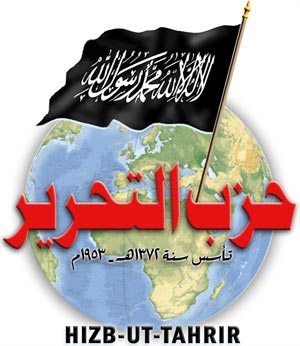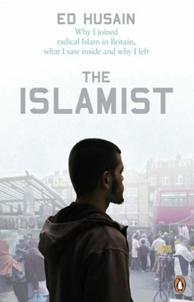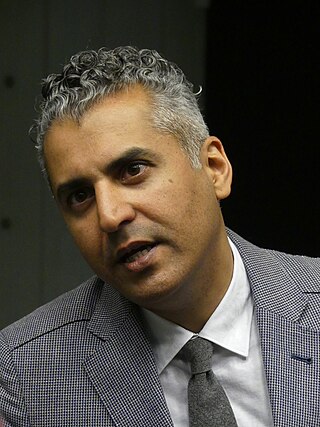Related Research Articles
Islamism refers to a broad set of religious and political ideological movements that believe Islam should influence political systems, and generally oppose secularism. The advocates of Islamism, also known as "al-Islamiyyun", are dedicated to realizing their ideological interpretation of Islam within the context of the state or society. The majority of them are affiliated with Islamic institutions or social mobilization movements, often designated as "al-harakat al-Islamiyyah." Islamists emphasize the implementation of sharia, pan-Islamic political unity, and the creation of Islamic states.
Omar Bakri Muhammad is a Syrian Islamist militant leader born in Aleppo. He was instrumental in developing Hizb ut-Tahrir in the United Kingdom before leaving the group and heading to another Islamist organisation, Al-Muhajiroun, until its disbandment in 2004.

Hizb ut-Tahrir is an international pan-Islamist and Islamic fundamentalist political organization whose stated aim is the re-establishment of the Islamic caliphate to unite the Muslim community and implement sharia globally.

Al-Muhajiroun is a proscribed terrorist network based and banned in Saudi Arabia and active for many years in the United Kingdom. The founder of the group was Omar Bakri Muhammad, a Syrian who previously belonged to Hizb ut-Tahrir; he was not permitted to re-enter Britain after 2005. According to The Times, the organisation has been linked to international terrorism, homophobia, and antisemitism. The group became notorious for its September 2002 conference "The Magnificent 19", praising the September 11, 2001 attacks. The network mutates periodically so as to evade the law; it operates under many different aliases.

Muhammad Taqi al-Din bin Ibrahim bin Mustafa bin Isma'il bin Yusuf al-Nabhani was a Palestinian Islamic scholar who founded the pan-Islamist and fundamentalist organization Hizb ut-Tahrir.

Jihadism is a neologism for militant Islamic movements that seek to base the state on Islamic principles. In a narrower sense, it refers to the belief held by some Muslims that armed confrontation with political rivals is an efficient and theologically legitimate method of socio-political change. It is a form of religious violence and has been applied to various insurgent Islamic extremist, militant Islamist, and terrorist individuals and organizations whose ideologies are based on the Islamic notion of lesser jihad from the classical interpretation of Islam. It has also been applied to various Islamic empires in history, such as the Rashidun and Umayyad caliphates of the early Muslim conquests, and the Ottoman Empire. There were also the Fula jihads in West Africa in the 18th and 19th centuries.

Islamic extremism, Islamist extremism or radical Islam refers to a set of extremist beliefs, behaviors and ideologies within Islam. These terms remain contentious, encompassing a spectrum of definitions, ranging from academic interpretations of Islamic supremacy to the notion that all ideologies other than Islam have failed and are inferior.
Wassim Doureihi is a prominent member of Hizb ut-Tahrir in Australia, a global Islamic political party that advocates the re-establishment of the Caliphate in the Muslim world. He is a spokesman for the organisation.

The Islamist: Why I Joined Radical Islam in Britain, What I Saw Inside and Why I Left is a 2007 book about Ed Husain's five years as an Islamist. The book has been described as "as much a memoir of personal struggle and inner growth as it is a report on a new type of extremism." Husain describes his book as explaining "the appeal of extremist thought, how fanatics penetrate Muslim communities and the truth behind their agenda of subverting the West and moderate Islam."

Maajid Usman Nawaz is a British activist and former radio presenter. He was the founding chairman of the think tank Quilliam. Until January 2022, he was the host of an LBC radio show on Saturdays and Sundays. Born in Southend-on-Sea, Essex, to a British Pakistani family, Nawaz is a former member of the Islamist group Hizb ut-Tahrir. His membership led to his December 2001 arrest in Egypt, where he remained imprisoned until 2006. While there, he read books about human rights and made contact with Amnesty International who adopted him as a prisoner of conscience. He left Hizb-ut-Tahrir in 2007, renounced his Islamist past, and called for a secular Islam. Later, Nawaz co-founded Quilliam with former Islamists, including Ed Husain.

The International Centre for the Study of Radicalisation and Political Violence (ICSR) is a non-profit, non-governmental think tank based in the Department of War Studies at King's College London whose mission is to educate the public and help policymakers and practitioners find solutions to radicalisation and political violence. It obtains some of its funding through the European Union.

Salafi jihadism, also known as jihadist Salafism and revolutionary Salafism, is a religious-political Sunni Islamist ideology that seeks to establish a global caliphate, characterized by the advocacy of physical jihadist attacks on non-Muslim targets. In a narrower sense, jihadism refers to the belief that armed confrontation with political rivals is an efficient and theologically legitimate method of socio-political change. The Salafist interpretation of sacred Islamic texts is "in their most literal, traditional sense", which adherents claim will bring about the return to "true Islam".
In the context of political aspects of the religion of Islam, political quietism has been used to refer to the religiously-motivated withdrawal from political affairs or skepticism that mere mortals can establish a true Islamic government. It is the opposite of political Islam, which holds that the Islamic religion and politics are inseparable, and Muslims should be fighting to establish true Islamic government.

Hizb ut-Tahrir America is a separate, but linked entity to the international pan-Islamist and fundamentalist organization that seeks to establish a global caliphate governed under Shariah law. Under this caliphate, members work toward uniting all Islamic countries as well as transforming secular, host countries into Islamic states. Hizb ut-Tahrir America's goals are the same as the global organization – the installation and implementation of sharia law as the sole source of law.
Madkhalism is a strain of quietist thought within the larger Salafi movement characterised by monarchism and loyalty to governments in the Arab world, based on the writings of Sheikh Rabee al-Madkhali.

Hizb ut-Tahrir is an international pan-Islamist and fundamentalist political organisation. The organisation is considered a "radical Islamic group" and has come under scrutiny from the Australian government.

Radical: My Journey out of Islamist Extremism is a 2012 memoir by the British activist Maajid Nawaz, who is also a former Islamist. First published in the United Kingdom, the book describes Nawaz's journey "from Muslim extremist to taking tea at Number 10". The United States edition contains a preface for American readers and a new, updated epilogue.

Starting in the mid-1970s and 1980s, Salafism and Wahhabism — along with other Sunni interpretations of Islam favored by the Kingdom of Saudi Arabia and other Gulf monarchies — achieved a "preeminent position of strength in the global expression of Islam."

Hizb ut-Tahrir Britain is the official name of the United Kingdom branch of Hizb ut-Tahrir, a transnational, pan-Islamist and fundamentalist group that seeks to re-establish "the Islamic Khilafah (Caliphate)" as an Islamic "superstate" where Muslim-majority countries are unified and ruled under Islamic Shariah law, and which eventually expands globally to include non-Muslim states such as Britain. The group was designated a proscribed terrorist organization in the UK in January 2024.

Hizb ut-Tahrir is a pan-Islamist and fundamentalist group seeking to re-establish "the Islamic Khilafah (Caliphate)" as an Islamic "superstate" where Muslim-majority countries are unified and ruled under Islamic Shariah law, and which eventually expands globally to include non-Muslim states. In Central Asia, the party has expanded since the breakup of the Soviet Union in the early 1990s from a small group to "one of the most powerful organizations" operating in Central Asia. The region itself has been called "the primary battleground" for the party. Uzbekistan is "the hub" of Hizb ut-Tahrir's activities in Central Asia, while its "headquarters" is now reportedly in Kyrgyzstan.